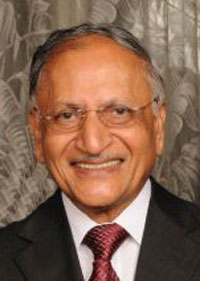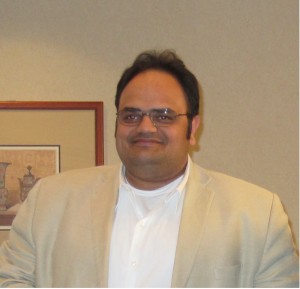
Braham Rattan Aggarwal
Braham Rattan Aggarwal
Born and brought up in Kenya, Africa. Braham Rattan Aggarwal was an accountant by profession and moved to UK in 1975 from Kenya and to US in 1984. Chairman of Park and Home – a land development and home building company. He is chairman of Hindu University of America (HUA). He is chairman of Patanjali Yogpheet of USA, involved in Ekal Vidyalaya and Paramshakti Peet – Sadhwi Ritambara ji based in India. He is also a HSS director of South East America. He is based out of Orlando, Florida.
By Rahul Chandra | 04-16-2014 | Orlando, FL, USA
When did you come to America?
1984
What made you concern on Hinduism?
Since childhood, we used to visit Arya Samaj where besides doing Havan (a sacred fire ritual) they talked of priest who was always very highly educated about our scriptures and talked about Vedic mantras and educate us about significance of those mantras. In US my concern intensified when I see that many priests are not educating or not able to communicate to American Hindus on significance and meaning of rituals. Also many times temple priests fail to reason out the significance of deity and various shapes they have. For example the ‘Trunk of Lord Ganesh’, ‘Lord Hanuman as monkey’ and ‘Physical postures of Hindu Gods’. Such failure leads to disinterest and puzzle mindset among American Hindu kids.
What challenges you envision in Hindu movement in America on a social & cultural level?
Ignorance of our teaching, lack of resources where people can learn about Hinduism, temples should have become a places of learning about Hinduism but unfortunately so far our priests are not either qualified or are not able to interact with young people in English language. Children have lot of questions about Deities in temple and about various items used in pujas (Hindu rituals). Also the language used by priest during rituals is Sanskrit is not understood by young people whether its pujas or weddings. Sometimes people say ‘do this fast – Pundit ji” because they don’t know what priest is doing and as a result of such disconnect, they lose interest.
In spite of 45 years of social organizations in America, why still such gap exists?
Social organization is aware of this gap, but they don’t know what to do about it. For first generation, earning – living and settling is the most priority. Young generation is now taking over leveraging the resources of older generation but role models are scare. Many Hindu families they have temples in their houses and take this approach of attaining Moksha for themselves individually. But there is no congregation in temples.
When you say “Social organizations are aware of this gap, but they don’t know what to do about it”, what do you imply?
Our structure has been everybody is for themselves, some organizations take care of members but overall. Social organizations are focused on socio – cultural needs of members but not for overall Hindu community. Then Hindu community is divided according to provinces and caste lines. They have their own sampradaya.
What solution you propose for above said issue?
Resources should have to be at temple level, it’s the temple where non Hindus and Hindus interested about Hinduism look forward to solution. Children are inquisitive in learning things; they have lots of questions about deities. Deities in house or temples, many times parents have no explanation and even temple priests have no explanation. Hindu University of America has come up with a small booklet explaining the meaning and significance of the deities. It’s online available on HUA website in Hindu and English at www.hua.edu.
(Web link to PDF file below) [wpba-attachment-list]
Significance-of-Hindu-Deities-Symbolism-English
http://www.hua.edu/doc/Significance-of-Hindu-Deities-Symbolism-English.pdf
We are also in a process of translating this booklet in Gujarati and other vernacular languages of India.
How this booklet is different from other Hindu gods and goddess books which present fasting methodology, devotional ways etc.?
The booklet explains the messages of various organs and items of the deity (murti), the usefulness or the art of living besides using the deity for foxing the
mind on the deity to ultimately to go within – manifestation. These messages are all universal, not particular for Hindus but to all Human society.
How many of such copies have been circulated yet?
20, 000 – 30, 000 books have been circulated in India and America at various social and Dharmic institutions.
How are people responding to this publication?
Response is huge; every temple we talked to is very receptive. One dedicated person in a temple can make a big difference if he /she can share such resource to temple members. We have discussed these booklets with Christians and Muslims too and they even showed lots of interests as they think Hindus have millions of gods and goddess and Muslims think, we worship stones. When explained to them about the significance, they are very happy about it. I have been talking to prominent leaders from business, law, medicine area and the response is immense. People, who call themselves as ‘secularists’, if they were to know the significance of deities – they will more incline to study, believe and accept Hindu teachings. Since Hindus have tens of prominent god and goddess.
How Hindu University of America publication is unique?
HUA is going to expand publishing in this area to more Hindu god’s families and the message their organs and ornaments provide.
What type of help you need from social – cultural organization?
We need to take it on and put it on internet and individuals will be able to get it on their own and kids will be able to learn it.
What led to formation of HUA?
There was one Hindu monk, Swami Tilak (America based), he suggested that since on the academic level there should be some institution which can train scholars with masters and PhD degrees so that they can teach in US universities.At present most professors teaching comparative religion are not Hindus. In academic world they don’t pay respect to Swamis however they educated may be. Like Swami Vivekanada with all his knowledge was denied participation in world parliament of religion, till a Harvard professor recommended his name.
California textbook – lots of misinformation in text books – being read by schools.
Please mentioned about issues in India on religious area
Temples are not organized and cleaned and not equipped with the right king of personal, educated and knowledge priests. Pilgrimage places are not cleaned and need lot of attention and cows whom we treat as our mothers are seen eating trash in various cities. Toilets for ladies are absent in Hindu temples at Hindu pilgrimage places. Respect for blue collar unskilled workers and that makes them prompt to conversion in Islam and Christianity. Illiteracy among tribal is another cause of conversions etc. Inferiority complex – educated people eager to copy American way of life, dresses, movies, songs etc. Valentine Day etc. Bollywood serials and movies are spreading lot of vulgarity, sending out wrong messages.
Need for Hindu University?
Academic universities in US don’t recognize Hindu saints and seers to be fit for dialog on contemporary religion. Thus it’s a necessity to have a university. People with PHD in contemporary religion would be considered to teach Hinduism in universities.
How many students we have enrolled in HUA?
50-60 students in Masters in PHD.
__________________________________________________________________________________________________________________________________________________________

Rahul Chandra
Rahul Chandra is a member of World Hindu News editorial board and a freelancer journalist. For more than a decade, he has been reporting, developing and publishing news & press releases for US and Indian Hindu organizations. Previously he has been an editor at World Hindu Council of America (VHPA) quarterly publication – Hindu Newsletter and Hindu Digest based out of Washington, DC. He has also been a media and PR coordinator for Hindu Congress of America (HMSA) at Texas in 2011. His interests include Hindu philosophies, Hindu human rights and Hindu social & political empowerment related journalism. He has also reported and published news on plight of Pakistani Hindu refugee in India and Bhutanese Hindu refugees in US. You can contact him for interview opportunities at rahul.chandra@worldhindunews.com.
—————————————————————————————————————————————————————————————————————————————————————————





